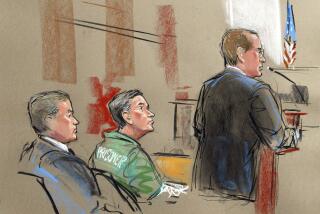Traded Czech Reportedly Unmasked CIA’s ‘Mole’
- Share via
WASHINGTON — Karl F. Koecher, the Czechoslovak spy who secretly pleaded guilty and was sentenced to life imprisonment before becoming part of the package deal for the freedom of Soviet dissident Anatoly Shcharansky, is believed to have helped to uncover a CIA operative inside the Soviet government, Justice Department sources said Tuesday.
The sources said that the CIA operative was Alexander Ogorodnik, an official in the Soviet Foreign Ministry, who reportedly died while being questioned by the KGB in 1977, two years after Koecher worked as a contract translator for the CIA.
In his CIA work, Koecher had access to the identity of some CIA operatives, including Ogorodnik, according to sources familiar with the Koecher case.
The United States has had difficulty in developing “moles” inside the Soviet bureaucracy, and the loss of Ogorodnik was considered a major setback, the sources said.
Nevertheless, Justice Department sources said they welcome the release of Koecher because of what they regard as weaknesses in the government’s espionage-conspiracy case against him.
The potential problems were caused by FBI and CIA agents who took part in the questioning of Koecher and his wife, Hana, in November, 1984, which led to Koecher’s indictment and his wife being held as a material witness.
Hana Koecher, like her husband, was required to renounce her naturalized U.S. citizenship before accompanying him into East Berlin on Tuesday.
A diamond trader in New York until her decision to leave the country, she appeared “very uneasy” during the transfer, said John L. Martin, chief of the Justice Department’s internal security section, who played a central role in overseeing the Koecher case and the exchange.
Wearing a mink coat and matching mink hat, “she took it (the exchange) as a bitter pill,” Martin reported to Justice Department colleagues Tuesday.
Department prosecutors had refused to seek Hana Koecher’s indictment, despite evidence that she served as a courier for Czechoslovak intelligence agents and had other alleged involvement in the conspiracy. They cited the FBI’s failure to heed her request to see an attorney during a 20-hour period when she was questioned by agents at a motel.
Prosecutors wanted to compel her to testify, seeking evidence to use against her husband, but she appealed, arguing that a wife cannot be compelled to testify about alleged criminal activities in which she had taken part. After the U.S. 2nd Circuit Court of Appeals agreed with her, the government appealed to the Supreme Court.
The justices heard arguments in the case last month, but her departure appears to make the issue moot and to forestall any ruling by the high court.
Koecher also challenged the evidence against him, which was based largely on interviews by CIA and FBI agents after his arrest.
His case, too, became moot when Koecher entered a guilty plea Feb. 3 in the chambers of U.S. District Judge Shirley W. Kram, a plea kept secret until the exchange was guaranteed.
More to Read
Sign up for Essential California
The most important California stories and recommendations in your inbox every morning.
You may occasionally receive promotional content from the Los Angeles Times.













